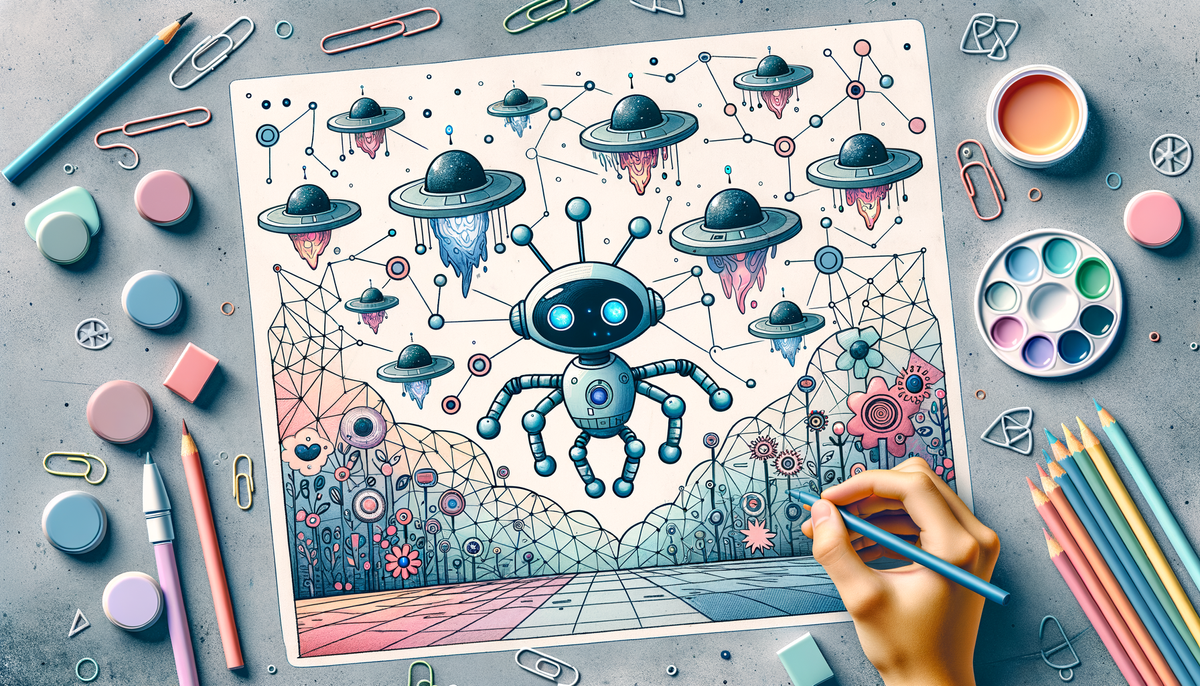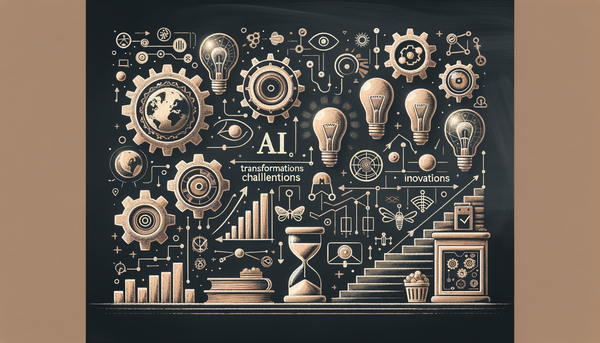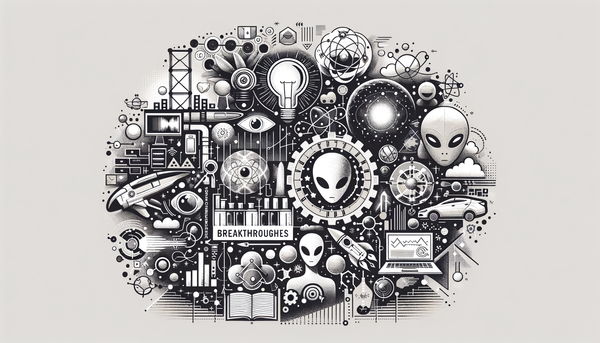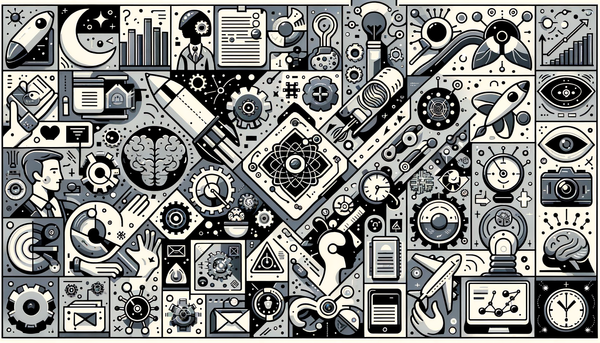Revolutionizing Advertising: Appier's Acquisition of AdCreative.AI

An In-Depth Look at the Transformative Impact of AI on Global Cooperation, Customer Service, Advertising, Relationships, and the Market
This comprehensive article explores diverse developments in artificial intelligence—from global calls for responsible leadership at international summits to innovative customer-first implementations across several sectors. It delves into cutting-edge integrations in customer service, generative AI's role in reshaping advertising, the intriguing intersection of AI and human relationships, and the economic influence of AI on market dynamics. With insights drawn from recent breakthroughs and analyses featured on AI.Biz, we examine how international collaboration, ethical practices, and technological advancements can drive positive societal impacts while managing inherent risks.
Global Cooperation and Responsible AI Governance
The urgency to guide the rapid development of artificial intelligence has never been more pronounced. At the recent Paris AI Action Summit, Dario Amodei, the CEO of Anthropic, delivered a powerful message emphasizing the need for global cooperation. By underscoring AI’s dual role as a potent ally and a potential threat, Amodei outlined a blueprint for ensuring responsible technological growth.
Amodei passionately called upon governments, businesses, and researchers to work together to develop comprehensive safety protocols. His statements resonate deeply in today’s era where technology advances exponentially. The call to align AI’s evolution with ethical frameworks is a holistic approach necessitated by the real-world impacts of these technologies. In an era where “Artificial intelligence is the new electricity” (Andrew Ng), ensuring that AI benefits humankind while mitigating risks is paramount.
An illustrative example can be seen in global collaborative efforts similar to climate accords. Just as countries negotiates targets to lower carbon emissions, AI policy frameworks require multinational agreements to foster transparency, accountability, and diversity in research and applications. The risks associated with AI, if left unchecked, may lead to unintended consequences—a sentiment echoed in Dario Amodei’s comprehensive address.
“By far, the greatest danger of Artificial Intelligence is that people conclude too early that they understand it.” – Eliezer Yudkowsky
It becomes clear that proactive collaboration and stringent ethical guidelines must be at the heart of any AI strategy. For more insights into AI's corporate applications and its strategic deployment, AI.Biz has published articles such as AppLovin Corporation: Navigating AI in Advertising and Assessing Generative AI ROI that explore the intersection of technology, policy, and business.
Revolutionizing Customer Service: AI’s Impact on Insurance Claims
AI is not confined to policy discussions and boardrooms; it’s also transforming front-line customer service in innovative ways. A notable development in this field comes from an insurance giant that recently introduced an AI-powered claims representative, one that exudes empathy and a human touch.
This breakthrough marks a significant departure from the monotonous, scripted interactions typically associated with automated customer service. The new AI claims rep employs advanced data analytics and machine learning algorithms to personalize customer interactions—understanding unique contextual needs and past experiences. Beyond the conventional functionality of processing claims, the system is designed to provide tailored solutions that make customers feel genuinely heard and cared for.
This emotional intelligence in AI is a testament to the fusion of technology with compassion, challenging the perception that machines are inherently cold and unresponsive. The move reflects broader industry trends that prioritize not just efficiency but also the quality of human interaction. It’s an early indicator that in the near future, we may see AI applications widely adopted across sectors to promote a richer, more empathetic customer experience.
As the insurance and customer service sectors continue to integrate AI technologies, new research and case studies provide a deeper understanding of customer-centric design. The ability to capture nuanced emotional cues and respond in a personalized manner is a game-changer. The future of AI-powered customer interfaces is bright, paving the way for systems that truly understand and respond to the complexities of human emotion.
For companies aiming to balance efficiency with empathy, this evolution in AI customer service offers both a challenge and an opportunity. It prompts them to consider how technology can complement human warmth in delivering exceptional service. With AI gradually transforming the insurance landscape, one can expect a ripple effect that reaches various other industries.
Generative AI: A Game-Changer in Advertising and Marketing
At the heart of modern marketing strategies is the need for dynamic and engaging advertising that resonates with a diverse audience. Appier’s acquisition of AdCreative.ai is a prime example of how generative AI technologies are reshaping the advertising landscape. This strategic move combines the advancing prowess of data-driven creation with the creativity traditionally attributed to human ingenuity.
By leveraging the proprietary algorithms of AdCreative.ai, Appier intends to revolutionize the content of digital advertising. The integration facilitates the creation of highly personalized ad content tailored to consumer preferences, thus significantly enhancing the efficacy of marketing campaigns. This merger not only symbolizes technological progress but also stands as a strategic response to the evolving demands of the digital marketplace.
The innovation lies in the ability of generative AI to craft creative assets that would typically require extensive human oversight. The fusion of analytics and creativity enables brands to produce eye-catching advertisements that are both relevant and engaging. This transformation is being driven by the increasing availability of high-quality data and unprecedented advancements in machine learning techniques.
From dynamic banner ads to personalized social media campaigns, the applications of generative AI in advertising are diverse and ever-growing. This technology allows for rapid iteration and adaptation, keeping pace with rapidly shifting consumer behaviors. As further evidence of AI’s profound impact on marketing, advanced digital advertising systems have been shown in multiple research studies to increase conversion rates by tailoring content to the viewer's interests.
The journey of generative AI in advertising parallels historical shifts seen in other technological adoptions. Just as the advent of television redefined marketing strategies in the mid-20th century, today's AI technologies promise to redefine how brands communicate their messages. To further explore such industry-transforming trends, our readers can refer to the article on AI News Podcast Highlights: Impact & Innovations in AI which offers additional perspectives on how technology is reshaping business narratives.
AI's Role in Transforming Human Relationships
The impact of AI extends far beyond boardrooms and campaigns—it has also carved out a space in the most intimate corners of human life: our relationships. According to a recent feature from MIT Technology Review, AI is increasingly playing a role in personal interactions, from matchmaking on dating apps to offering advice for maintaining strong relationships.
As technology becomes more intertwined with our personal experiences, the lines between machine intelligence and human emotion blur. Advanced matchmaking algorithms analyze a range of data points—preferences, behavioral patterns, historical interactions—to deliver compatibility matches that often exceed traditional human expertise. Beyond dating, AI-powered systems now suggest communication strategies that help couples navigate conflicts and enhance mutual understanding.
This ongoing transformation has ignited a stimulating debate about the proper role of AI in emotional and relational contexts. Critics question whether an algorithm could ever truly understand the depth and nuance of human love and pain. On the other hand, proponents argue that AI serves as a valuable ally in personal development by offering objective insights to complement our natural instincts.
An interesting perspective on this debate comes from the realization that every technology once deemed impersonal has gradually been integrated into our daily lives, enriching our experiences rather than trivializing them. With advancements in sentiment analysis and natural language processing, AI's role in our relationships is becoming more supportive, rather than substitutive, of genuine human connection.
It’s critical to emphasize that the goal of integrating AI into personal relationships isn’t to supplant human interaction but to augment it. In a world where many feel disconnected, AI can serve as a bridge—providing guidance, support, and even companionship. This technology prompts us to reconsider what it means to connect in a digital age and encourages a balanced synthesis of machine intelligence with human intuition.
In an era marked by rapid social and technological change, the concept of AI-assisted relationships will likely continue to evolve. By examining both the benefits and potential pitfalls, we gain a clearer perspective on how to harness the power of AI in ways that bolster, rather than diminish, our humanity.
The Economic and Geopolitical Dimensions of AI
In the corporate and economic arena, artificial intelligence is proving to be a disruptive force that is reshaping market dynamics. A compelling example of this phenomenon is found in the performance of Cisco’s shares, which have witnessed a boost due to surging demand for AI equipment. As companies across the globe increasingly invest in AI technologies, firms like Cisco are strategically positioned to benefit from this boom.
However, not all trends in this AI-driven economic landscape are smooth sailing. Ongoing geopolitical tensions and trade policies—such as tariffs imposed by the Trump administration—inject a note of caution. These policies have the potential to affect cost structures, creating both temporary setbacks and strategic challenges for technology companies.
The tug-of-war between technological innovation and protectionist policies is an age-old story reimagined in the context of AI. While AI fuels growth and investor optimism, market players must consistently navigate regulatory hurdles. This duality highlights the delicate balance between harnessing innovation and managing economic uncertainties.
For investors and technology enthusiasts, the trajectory of companies like Cisco is fascinating to monitor. Their case exemplifies the broader narrative of AI’s transformative economic potential. As the market evolves, detailed analyses and fresh insights, like those shared on platforms such as Reuters and AI.Biz’s dedicated pieces, become indispensable resources.
A historical parallel can be drawn with earlier technological revolutions. Just as the introduction of personal computers reshaped economies while initially facing skepticism and regulatory challenges, the advent of AI is now charting a similar path. Companies that foresee these trends and adapt quickly can not only mitigate looming challenges but also lead the charge toward a more interconnected, technologically advanced future.
The current market climate serves as a reminder that technological innovation while promising, must be pursued with an awareness of its greater economic and geopolitical implications. Integrating AI thoughtfully and responsibly will be crucial as nations and corporations strive to maximize the benefits while keeping potential pitfalls at bay.
Bridging the Gaps: Integrative Perspectives on AI’s Future
When we examine the various dimensions of artificial intelligence—from ethical governance and customer experience to advertising innovation, relationship dynamics, and market forces—it becomes evident that AI is a multifaceted tool with far-reaching implications. Its ability to reshape industries, influence policies, and redefine human interactions is unprecedented, marked by both promise and challenge.
Considering the global call for responsible AI governance outlined by Anthropic's Dario Amodei, the push for ethical frameworks reflects a need that resonates across all sectors. It reminds us that the core of AI’s potential remains tethered to its safe, reliable, and human-centric use.
In sectors like insurance, we see a heartening development where technology begins to breathe life into customer interactions. The compassionate AI claims rep stands as a beacon of what can be achieved when empathy meets innovation—demonstrating that machine-based solutions can be nuanced to meet human needs. Such innovations not only elevate service standards but also address long-standing challenges in customer relations.
Advertising, too, is undergoing a renaissance. The synergy between generative AI and creative marketing exemplifies the dynamic nature of digital transformation. The Appier and AdCreative.ai collaboration is indicative of a market increasingly driven by personalized content—a trend that challenges traditional advertising norms and opens up new realms of customer engagement.
Moreover, AI's influence on personal relationships offers a blend of excitement and introspection. By supporting enhanced interpersonal communication and offering insights for relationship improvement, technology is beginning to fulfill roles that once belonged solely to human intuition. This intersection of technology and emotion not only paves the way for innovative tools but also sparks broader conversations about connectivity in the modern world.
Finally, from an economic perspective, the surge in AI demand and the subsequent market reverberations underline the transformative power of these technologies. Despite regulatory headwinds, the economic benefits of AI adoption illustrate a trend that is both invigorating and worth monitoring. Corporate strategies are being revamped and traditional business models are evolving, much like the transition periods of major historical revolutions.
Throughout these shifting landscapes, one constant truth prevails: the transformative power of AI lies in its ability to bridge gaps and bring together diverse facets of our society. Whether it’s redefining customer service, enabling smarter advertising solutions, deepening our connections with loved ones, or invigorating the global economy, AI is a catalyst for change that demands balanced stewardship and visionary planning.
Further Readings and Perspectives
For those interested in delving deeper into these topics, AI.Biz offers several insightful reads. The article on AppLovin Corporation: Navigating AI in Advertising examines the use of AI in digital marketing, while AI News Podcast Highlights: Impact & Innovations in AI provides a broader understanding of the evolving landscape of AI technologies. Additionally, exploring Assessing Generative AI ROI offers strategic insights for measuring the impact of AI investments, and Expanding Horizons: The Future of AI paints a visionary picture of what lies ahead.
In our continuous journey to understand and leverage the power of AI, these resources serve as both an inspiration and a critical guide. Embracing this multifaceted transformation with open-minded collaboration and rigorous ethical standards will undeniably chart a course toward a future where technology serves the greater good.




